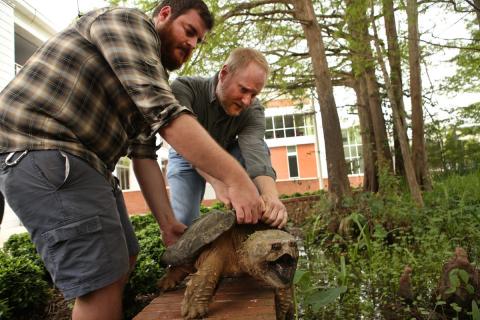Biology PhD Candidate Receives Graduate Student Teaching Excellence Award
Environmental and Evolutionary Biology Ph.D. candidate Michael Fulbright is the recipient of the 2020 Graduate Student Teaching Excellence Award.
Graduate students who take on teaching responsibilities make important contributions to our University’s undergraduate teaching mission. The Graduate Student Teaching Excellence Award recognizes an exceptional graduate teaching assistant who has served as the official instructor of record.
Michael has gained extensive teaching experience during his doctoral studies. In addition to his time as a teaching assistant for ten different courses, he has given invited lectures and helped lead field trips for several additional courses.
These experiences prepared him well to serve as the instructor of record for Biology 121: Biology Principles and Issues I. The instructor of this large course for non-majors has a critical role in helping undergraduate students think critically about issues like medical care, environmental policies, and even political discourse relating to science and education.
Michael’s record of assisting with a wide range of courses gave the department confidence in his preparedness to teach this key offering.
“Michael is one of those few educators whose good nature, comfortable interactions, and enthusiasm for biology make it fun to learn advanced and complex material,” notes Dr. Brad Moon, graduate coordinator and South Louisiana Mid-Winter Fair/BoRSF Professor of Environmental Science.
“He knows the material well, communicates clearly and enthusiastically, helps identify where students need help, and has a supportive and approachable style of engaging with the students that they appreciate and find very helpful.”
Michael is a member of Dr. Moon’s lab working in comparative physiology and functional morphology. His dissertation investigates the adaptations that allow map turtles to break open strong clamshells and eat the clams that other species of turtles cannot feed on.
The diverse ecosystem of Cypress Lake was one of the key reasons he decided to study at UL Lafayette. In a serendipitous moment, he even had the opportunity to observe a rarely seen alligator snapping turtle when it wandered out of the lake after a storm.
As an educator, Michael prides himself on sharing his passion for biology with his students while being attentive to their individual needs.
“The dialogue that I establish with my students is a fairly simple approach: tell me how I can be the best instructor for you,” he says.
As he develops best practices for sharing his knowledge and experience with students, Michael emphasizes the need to teach his students to critically evaluate scientific information and develop their skills in disciplinary writing.
“I hope this approach will encourage them to pursue further training or use those skills to promote science education,” he says.
The Graduate School is proud to recognize Michael’s outstanding teaching and his great commitment to undergraduate student success.
Learn more about our doctoral program in environmental and evolutionary biology.
